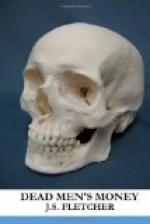But when I reached the office, Mr. Lindsey, who had been out to get his lunch, knew all about it. He was standing outside the door, talking to Mr. Murray, and as I went up the superintendent turned away to the police station, and Mr. Lindsey took a step or two towards me.
“Have you heard this about that man Crone?” he asked.
“I’ve heard just now,” I answered. “Chisholm told me.”
He looked at me, and I at him; there were questions in the eyes of both of us. But between parting from the police-sergeant and meeting Mr. Lindsey, I had made up my mind, by a bit of sharp thinking and reflection, on what my own plan of action was going to be about all this, once and for all, and I spoke before he could ask anything.
“Chisholm,” said I, “was down that way, wondering could he hear word of Crone’s being seen with anybody last night. I saw Crone last night. I went to his shop, buying some bits of old stuff. He was all right then—I saw nothing. Chisholm—he says Crone was a poacher. That would account, likely, for his being out there.”
“Aye!” said Mr. Lindsey. “But—they say there’s marks of violence on the body. And—the long and short of it is, my lad!” he went on, first interrupting himself, and then giving me an odd look; “the long and short of it is, it’s a queer thing that Crone should have come by his death close to the spot where you found yon man Phillips! There may be nothing but coincidence in it—but there’s no denying it’s a queer thing. Go and order a conveyance, and we’ll drive out yonder.”
In pursuance of the determination I had come to, I said no more about Crone to Mr. Lindsey. I had made up my mind on a certain course, and until it was taken I could not let out a word of what was by that time nobody’s secret but mine to him, nor to any one—not even to Maisie Dunlop, to whom, purposely, I had not as yet said anything about my seeing Sir Gilbert Carstairs on the night of Phillips’s murder. And all the way out to the inn there was silence between Mr. Lindsey and me, and the event of the morning, about Gilverthwaite’s will, and the odd circumstance of its attestation by Michael Carstairs, was not once mentioned. We kept silence, indeed, until we were in the place to which they had carried Crone’s dead body. Mr. Murray and Sergeant Chisholm had got there before us, and with them was a doctor—the same that had been fetched to Phillips—and they were all talking together quietly when we went in. The superintendent came up to Mr. Lindsey.
“According to what the doctor here says,” he whispered, jerking his head at the body, which lay on a table with a sheet thrown over it, “there’s a question as to whether the man met his death by drowning. Look here!”
He led us up to the table, drew back the sheet from the head and face, and motioning the doctor to come up, pointed to a mark that was just between the left temple and the top of the ear, where the hair was wearing thin.




